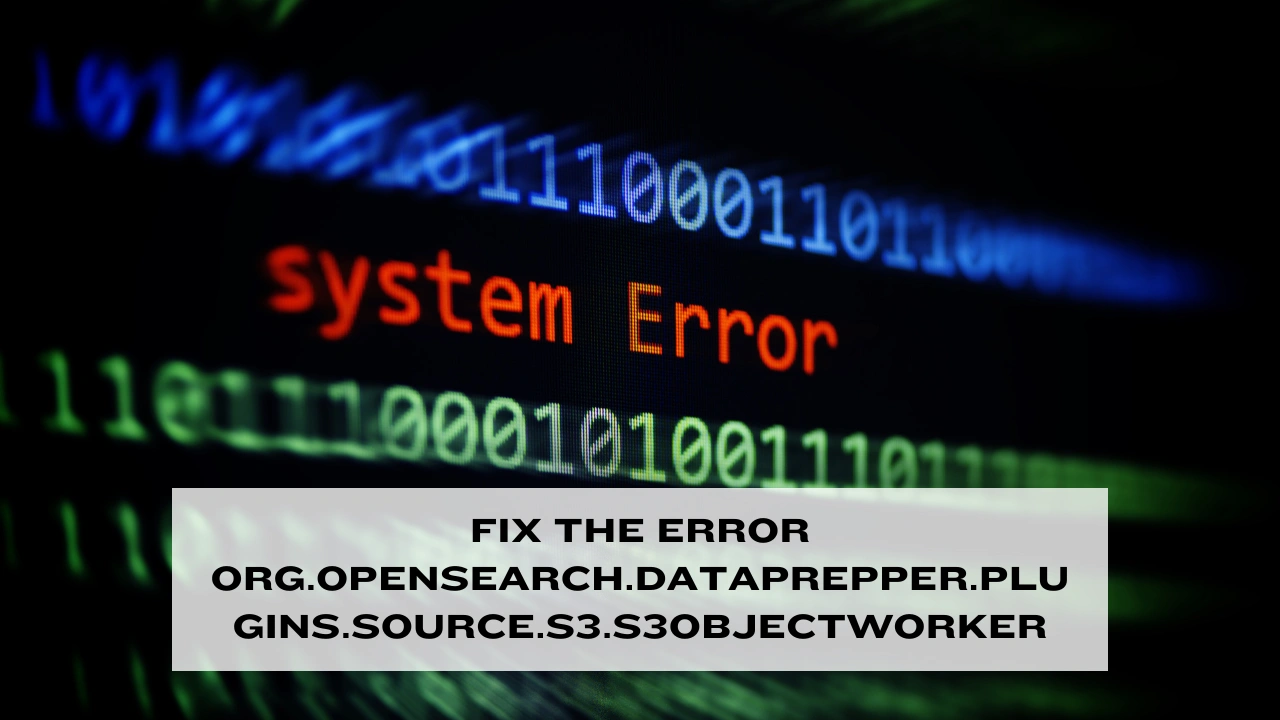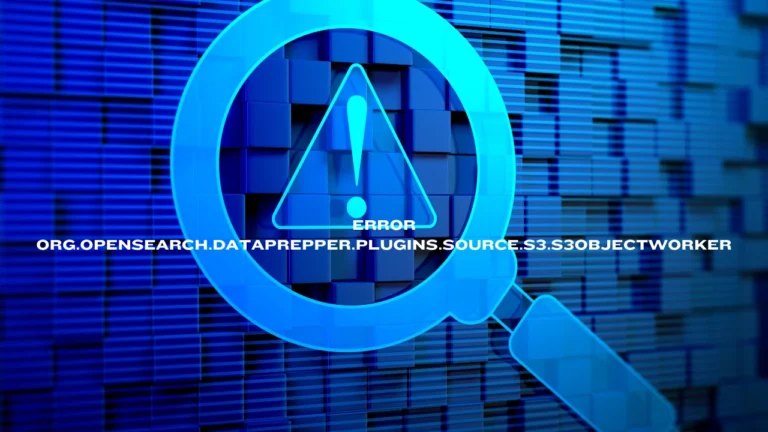OpenSearch Data Prepper is a vital tool for ingesting and processing data from Amazon S3. However, users often face challenges when configuring it, and one common issue is the error org.opensearch.dataprepper.plugins.source.s3.s3objectworker. This error typically appears when Data Prepper struggles to read, process, or retrieve objects from an S3 bucket. Understanding its causes and solutions is crucial for smooth data ingestion and processing.
What is error org.opensearch.dataprepper.plugins.source.s3.s3 objectworker?
The error org.opensearch.dataprepper.plugins.source.s3.s3objectworker occurs when Data Prepper encounters an issue while fetching objects from S3. This issue might stem from misconfigurations, incorrect IAM permissions, incompatible data formats, network issues, or S3 bucket-related settings. Since Data Prepper is widely used for streaming data into OpenSearch, any disruptions in its pipeline can cause delays in data analysis and visualization.
Also Read: How to Fix the Lexus SC 430 Convertible Rear Glass Rattle A Complete Guide
Common Causes of the Error
Several factors can trigger the error org.opensearch.dataprepper.plugins.source.s3.s3objectworker. Identifying the root cause is essential for applying the right fix.
- Incorrect IAM Permissions – OpenSearch Data Prepper requires specific AWS permissions to access and retrieve objects from an S3 bucket. Missing permissions can prevent it from fetching data.
- Data Format Issues – If the format of data stored in the S3 bucket does not match the format expected by Data Prepper, the error may occur.
- Empty or Corrupt S3 Objects – When Data Prepper encounters an empty or improperly structured file, it may fail to process it.
- S3 Bucket Region Mismatch – If the S3 bucket is in a different region than specified in Data Prepper’s configuration, access issues can arise.
- Network and Connectivity Problems – If Data Prepper cannot communicate with S3 due to VPC restrictions, proxy settings, or firewalls, the pipeline will fail.
How to Fix the Error org.opensearch.dataprepper.plugins.source.s3.s3objectworker
To resolve the error org.opensearch.dataprepper.plugins.source.s3.s3objectworker, follow these steps carefully.

1. Check and Update IAM Permissions
Data Prepper relies on AWS Identity and Access Management (IAM) policies to interact with S3. If these permissions are not correctly set, it will be unable to fetch objects.
Ensure your IAM policy includes:
s3:GetObject– To retrieve objects from S3.s3:ListBucket– To list available objects in the bucket.s3:GetBucketLocation– To determine the bucket’s region.
2. Verify Data Format and Codec Configuration
Data Prepper expects data in a specific format, such as JSON, CSV, or log files. If the file format is incompatible with the defined codec, processing errors occur.
Make sure that:
- The format of the files in S3 matches the codec setting in the Data Prepper configuration.
- If files are compressed, ensure Data Prepper is configured to handle decompression.
3. Inspect S3 Object Content
Data Prepper may fail if it encounters empty or corrupt files. If objects in the S3 bucket are missing essential data or are not structured correctly, ingestion fails.
To fix this:
- Open the S3 console and inspect file contents.
- Download the files and verify their integrity.
- Replace empty or corrupted objects with properly formatted data.
4. Ensure the Correct S3 Region is Specified
If Data Prepper’s configuration points to the wrong AWS region, it will not be able to access the S3 bucket.
To verify:
- Check the bucket’s region in the AWS console.
- Update the Data Prepper configuration file with the correct region.
5. Check Network and Connectivity Settings
Connectivity issues may arise if Data Prepper is running in a restricted network environment, such as behind a corporate firewall or within a VPC with limited access.
To troubleshoot:
- Ensure the instance running Data Prepper has outbound internet access.
- If using a private S3 bucket, configure an S3 VPC endpoint.
- Verify firewall and security group settings allow communication with S3.
How to Troubleshoot and Fix Corrupt S3 Data Issues
Resolving OpenSearch indexing failures due to corrupt S3 data requires a structured approach, including log analysis, data validation, and proper preprocessing techniques.
Analyzing OpenSearch and Data Prepper Logs
Checking OpenSearch logs provides insights into the exact cause of indexing failures. Errors such as failed to parse field or unexpected null value indicate data inconsistencies. Similarly, reviewing Data Prepper logs can reveal if S3 objects are being skipped due to corruption.
Validating Data in S3 Before Indexing
Performing pre-ingestion validation ensures that data stored in S3 is correctly formatted and complete. Running sample queries using AWS Athena or manually inspecting S3 objects for missing fields, syntax errors, or encoding issues can help identify problems before ingestion and prevent the error org.opensearch.dataprepper.plugins.source.s3.s3objectworker from disrupting the data pipeline.
Implementing Data Cleaning and Formatting Pipelines
Preprocessing data before it reaches OpenSearch reduces indexing failures. Using tools like AWS Glue or custom Python scripts to clean and normalize data can eliminate corrupt records, fix encoding errors, and ensure data consistency. Automating this process minimizes human intervention.
Checking and Repairing Compressed Files
If data corruption originates from compressed files, verifying file integrity before ingestion is critical. Running checks using gzip -t for GZIP files or parquet-tools validate for Parquet files ensures that files are correctly formatted and readable by OpenSearch.
Also Read: Guggenheim Mike Dingman A Trailblazer in Financial Leadership
Enforcing Schema Consistency in OpenSearch
Defining strict mappings in OpenSearch prevents schema mismatches. By ensuring that all S3 data aligns with the expected schema, indexing failures due to incorrect data types or missing fields can be avoided.
Configuring Retry Mechanisms for Data Prepper
Setting up error-handling mechanisms within Data Prepper allows automatic retries for failed indexing attempts. If an S3 object causes repeated failures, skipping the corrupt record or logging it for manual inspection prevents pipeline disruptions.
Automating S3 Data Health Checks
Implementing an automated S3 data validation system helps detect corrupt files before they reach OpenSearch. AWS Lambda functions, Glue jobs, or custom scripts can periodically check S3 data for inconsistencies and generate alerts.
Understanding the Role of S3 Data in OpenSearch Indexing
Amazon S3 serves as a reliable data storage solution, but data corruption, improper formatting, or missing fields can cause errors when OpenSearch attempts to index records. OpenSearch relies on well-structured data that conforms to predefined schemas. If data retrieved from S3 is malformed, contains invalid characters, or lacks required fields, indexing operations can fail. The error logs from OpenSearch typically indicate parsing failures, mapping mismatches, or unexpected null values.
When OpenSearch Data Prepper processes data from S3, it applies codecs and data transformations to prepare it for indexing. If Data Prepper encounters corrupt S3 objects, it might either skip the data, fail the entire ingestion pipeline, or push incomplete records to OpenSearch, making search results unreliable. Identifying the cause of corruption and rectifying it ensures that data integrity is maintained.
Common Causes of Indexing Failures Due to Corrupt S3 Data
Data corruption in S3 can occur due to various reasons, including incorrect data formatting, incomplete file uploads, encoding mismatches, or storage failures. Understanding the root cause is essential for effective troubleshooting.
Data Format Inconsistencies
OpenSearch expects data in formats such as JSON, CSV, or logs. If S3 objects contain improperly structured JSON, unescaped characters, or invalid syntax, indexing will fail. Even a missing closing bracket in JSON files can cause errors.
Encoding Issues and Special Characters
Incorrect character encoding can lead to data misinterpretation, causing indexing failures. If S3 objects contain special characters, non-UTF-8 encoded text, or binary data without proper conversion, OpenSearch may reject them. Encoding mismatches can be particularly problematic when dealing with multi-language datasets.
Incomplete or Partially Uploaded Files
If data ingestion processes upload only part of a file to S3, Data Prepper might attempt to process an incomplete document. Network interruptions, storage failures, or failed batch uploads can cause such issues. When OpenSearch receives incomplete records, it either throws errors or indexes incomplete data, affecting search accuracy.
Also Read: 2024 Mercedes Benz CLE Coupé Pris Danmark A Comprehensive Guide to Pricing, Features, and Performance
Incorrect Data Types and Schema Mismatches
OpenSearch enforces strict data types based on mapping configurations. If an S3 object contains a string in a field where OpenSearch expects an integer, indexing will fail. Schema mismatches frequently occur when dealing with log files, where unexpected null values or mixed data types can cause mapping conflicts.
Corrupt Compressed Files
When S3 stores compressed data in GZIP, Parquet, or Avro format, improperly compressed or corrupted files can cause OpenSearch indexing failures. If Data Prepper is unable to decompress these files correctly, indexing operations may not retrieve the expected records.
Comparison of Possible Causes and Solutions
| Issue | Cause | Solution |
|---|---|---|
| IAM Permissions Error | Missing s3:GetObject or s3:ListBucket permissions |
Update IAM policy with correct permissions |
| Data Format Mismatch | Data format does not match expected codec | Ensure correct file format and update codec settings |
| Empty or Corrupt S3 Objects | Objects contain no data or are malformed | Inspect, download, and replace problematic files |
| Region Mismatch | Bucket region differs from configuration | Update Data Prepper with the correct region |
| Network Issues | Blocked internet access, incorrect firewall rules | Configure security groups, add VPC endpoint |
Preventing Future Occurrences of This Error
After resolving the error org.opensearch.dataprepper.plugins.source.s3.s3objectworker, it’s important to take preventative measures to avoid it in the future.
Implement Continuous Monitoring
Use logging tools to track Data Prepper’s interactions with S3. This helps detect anomalies early and prevents pipeline failures.
Perform Regular Data Validation
Before uploading files to S3, validate them to ensure they match the expected format and structure. This prevents errors due to format mismatches.
Audit IAM Permissions Periodically
AWS policies can change over time, and permissions may be updated or revoked. Conduct regular IAM audits to ensure Data Prepper has the required access.
Automate Configuration Checks
Use automated scripts to verify that the S3 region, IAM permissions, and data formats are correctly configured. This reduces the chances of misconfigurations causing failures.
Also Read: How Ebook Ghostwriting Can Help You Build a Personal Brand and Authority
Conclusion
The error org.opensearch.dataprepper.plugins.source.s3.s3objectworker is a common challenge when working with OpenSearch Data Prepper. It usually stems from IAM permission issues, data format mismatches, empty objects, incorrect region settings, or connectivity problems. By carefully reviewing and addressing these factors, you can ensure a seamless data ingestion process.
Following best practices such as regular monitoring, data validation, IAM audits, and automation will help prevent this error from reoccurring. OpenSearch Data Prepper is a powerful tool, and keeping it configured correctly will allow you to process and analyze data efficiently.
By taking these proactive measures, you can ensure that your OpenSearch Data Prepper pipeline runs smoothly without encountering the error org.opensearch.dataprepper.plugins.source.s3.s3objectworker in the future.
